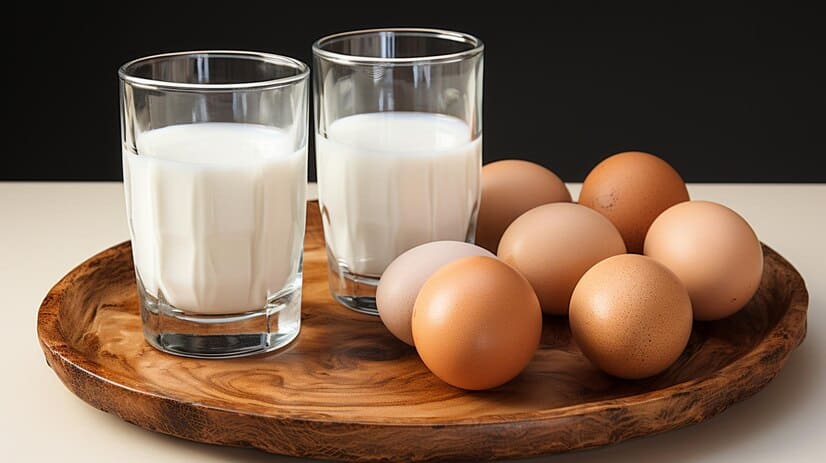Milk vs. Eggs – Exploring Nutritional Value and Health Benefits

Welcome to our friendly chat about two powerhouses in the nutritional world – milk and eggs. You’ve probably had your mom or grandma tell you about the goodness of these foods more than once. And they were not kidding! Both are packed with nutrients essential for our body. But, when pitted against each other, which one truly holds the crown for being better for health? Let’s crack this mystery wide open, shall we?
Milk Vs Egg
Nutritional Value of Milk
Milk is like a comforting hug from within. It’s been our first food and, for many, continues to be a diet staple. A glass of milk is loaded with calcium, vital for strong bones and teeth. It’s also rich in vitamin D, which helps our body absorb that calcium efficiently. Plus, it’s a good source of protein and contains vitamins A and B12, potassium, phosphorus, and several other nutrients.
Here’s a fun fact: Have you ever noticed how a warm glass of milk before bed can send you off to dreamland? That’s because milk contains tryptophan, an amino acid that can help you sleep better.
Nutritional Value of Eggs
Now, let’s talk about eggs – nature’s multivitamin. They’re pretty much the superheroes of the food world. One egg contains an impressive range of vitamins and minerals. They are rich in high-quality protein, with all the essential amino acids in the right ratios.
Eggs are one of the few foods naturally containing vitamin D, and they’re a great source of choline, which is critical for brain health. And let’s not forget about the antioxidants lutein and zeaxanthin, important for eye health, and of course, the famous omega-3 fatty acids, especially in eggs from chickens fed omega-3 enriched feed.
So, you remember the colorful charts of a balanced diet you were shown in school? Eggs practically tick all the boxes.
Taste and Usage in Cooking
Talking about taste, milk and eggs both have their unique charm. Milk can be consumed directly or used as a base for numerous recipes – be it your morning cereal, smoothies, or the secret ingredient in your pancake batter.
On the other hand, eggs are incredibly versatile in cooking. They can be boiled, fried, poached, scrambled, or used as a key component in baking. Ever tried an omelette with cheese and veggies? That’s the versatility of eggs, creating dishes that range from simple to complex, catering to every taste.
Dietary Restrictions and Allergies
It’s important to note that not everyone can enjoy these nutritional powerhouses due to allergies or dietary restrictions. Milk allergies and lactose intolerance can make milk consumption a no-go for some. Meanwhile, egg allergies are one of the most common food allergies, particularly in children, though many outgrow it.
Personal Anecdote
I remember when my sister discovered she was lactose intolerant. It was a bit of a journey, finding alternatives that she enjoyed and that her body could handle. And as for me? I’ve always been an egg enthusiast. There’s something incredibly satisfying about starting the day with a perfectly cooked egg.
What’s Better For Health?
So, back to our big question: Milk or eggs, which one is better for health? Honestly, it’s like asking to choose between oxygen and water – both are essential in their own right. The choice largely depends on your nutritional needs, dietary preferences, and, of course, how your body reacts to each.
Eggs offer high-quality protein and a wide range of vitamins and minerals. Milk is a calcium champion and also brings a lot to the table in terms of nutrition.
Both have their superpowers, and including both in your diet can lead to a well-rounded nutritional profile.
Conclusion
In the friendly battle of milk vs. eggs, it’s safe to say it’s a tie – with a slight edge depending on your personal nutritional needs and how your body handles each. Each has its unique benefits and can contribute to a healthy, balanced diet.
Your turn! Have you got funny or interesting stories about your experiences with milk and eggs? Or maybe a favorite recipe that cleverly combines both? We’d love to hear from you in the comments below. Let’s keep the conversation going and learn from each other’s experiences.
And remember, the key to a healthy diet is variety and balance. So, why not have the best of both worlds?
Also Read: Navigating the Keto Craze: What You Need to Know About the Ketogenic Diet